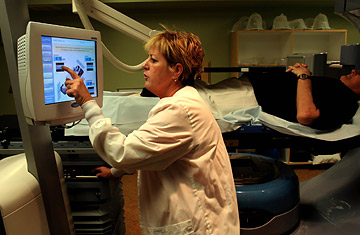
A radiation therapist at the Arizona Cancer Institute, sets up the Calypso 4D Localization System to pinpoint radiation for prostate cancer patient.
Prostate cancer may not be at the top of your list of topics for dinner conversation with Dad. But you might reconsider: About 10% of prostate cancer cases are linked with family history, and evidence for the disease's genetic roots is growing. Researchers have recently identified a series of gene markers that, when present with family history of the disease, increase a patient's risk of prostate cancer more than nine times. Those markers, say researchers, can be detected in a simple saliva or blood sample — good news for a condition whose prognosis is improved by early detection.
In a study published online today by the New England Journal of Medicine (NEJM), a team of American and Swedish researchers reported the results of a DNA analysis of over 4,700 Swedish men. The study found that patients whose genes contained four of the five common variants, found to be associated with prostate cancer in 2006 and 2007, had a 400% to 500% increased risk of developing the disease. That risk shot up to over 900% in patients who had the genetic variants and a family history, accounting for nearly half of the prostate cancer cases in the study. "We've never seen this before," says Dr. Jianfeng Xu of Wake Forest University School of Medicine and one of the authors of the study conducted jointly with researchers at Sweden's Karolinksa Institute and Johns Hopkins Brady Urological Institute, among others. Because the variants are common in the general population and their collective association with cancer is so strong, Xu says his findings could help doctors move quickly into the next phase of prostate cancer research: "How to predict individual risk for prostate cancer and catch it early."
Xu hasn't wasted any time taking his own advice. He and a colleague at Wake Forest have already spun a private business around the study's results — Proactive Genomics, which, like many similar companies that have sprung up recently, will offer a personal genetic test. This one, however, says Xu, will be the world's first genetic screen for a specific disease. To assess cancer risk, patients and doctors currently rely on physical symptoms, age, race, family history and PSA screens — tests that measure blood levels of prostate-specific antigens, which are produced in high amounts by an unhealthy prostate. Xu says his new genetic test — which would require patients to send in blood or saliva samples to be screened for the variants identified in the study — would complement established methods. "We're devoted to improving the situation," says Xu, estimating that his test would cost a few hundred dollars, and could eventually be included in standard health care. "We want to make this very affordable."
While Xu's test may help identify at-risk patients more accurately and earlier, what it won't do is tell patients — or doctors — who's at risk for developing aggressive, life-threatening disease. In fact most prostate cancer cases in the United States never become lethal: 99% of men diagnosed with prostate cancer — the vast majority of whom are over 65 — survive at least five years, according to the American Cancer Society, and many die with the disease, not because of it. Still, prostate cancer does kill some 30,000 men a year in U.S. Learning more about genetic predisposition, particularly through a test that does not require cancer to be present to determine risk (PSA screening does), may help lead to the way to identify gene markers for the lethal variant of the disease. "It's a step in the right direction," says Dr. William Isaacs, a professor of urology and oncology at the Brady Urological Institute at Johns Hopkins School of Medicine and a co-author of the study. "Who's at risk of a more aggressive disease? That's where we'd like to go."
That research is also already underway. In a study published in the journal Lancet in October, Dr. Henrik Gronberg, another co-author of the NEJM study from the Karolinksa Institute, found an association between family history and aggressiveness in certain kinds of cancer. He found that a woman whose mother died from breast cancer, for instance, was also more likely than other women to develop an aggressive form of the disease. Gronberg says the goal is to establish a specific link between genetic markers, risk, and a cancer's potential invasiveness. "We're reading about genetic factors for these common human diseases almost on a weekly basis now," says Isaacs. "The bad news is that some people may be at higher risk, but the good news is you may be able to do something about it."
